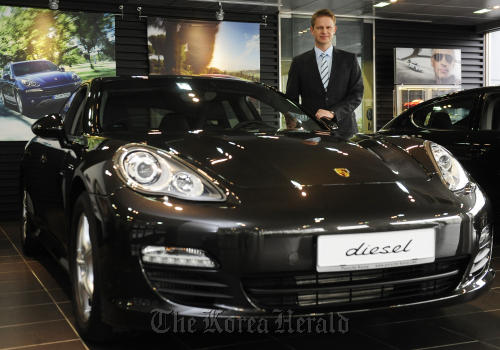Korea rises to 3rd in terms of new car sales of the premium sports car maker
Porsche enjoyed a record year in sales driven by their non-sports models.
“The great thing that happened was the Cayenne, which was introduced here in Korea in June 2010, and that hit the sweet spot of the customers here,” said Porsche president in Korea Michael Vetter.
The sports car company has been in Korea since 1986 but suffered tremendously during the financial crisis that hit the country from 1997-98.
In 2000, Porsche sold only eight cars. In 2005, the year Vetter arrived to head the local operation, Porsche had garnered 30 unit sales for the year.
Last year, sales jumped 85 percent from 2010 with 1,301 new Porsches purring along Korean roads.
“What also helped was that we had the Cayenne diesel as well, which is our top seller among the Cayenne model range,” he said. “Then the Panamera helped a lot. Also the extended engine lineup offered.”
 |
Porsche President and Joint Representative Michael Vetter poses with one of their hottest sellers, the Panamera diesel (The Korea Herald) |
Out of all the models, Vetter noted that the Cayenne was the big driving force for Porsche’s strong presence in the sports car market.
The sporty SUV and sedan opened the door to new customers that would not have been able to justify owning a sports car.
The Korea-European Union free trade agreement did help lower import tariffs, but that was not the main driving force for the increase in sales.
“For us what was important was to harmonize the standards between Europe and Korea, which enabled us to bring in cars that we were not able to bring in before. So that was a positive factor for us,” he said.
 |
Porsche’s premier sports car, the 911 GT3RS. (The Korea Herald) |
The 911 GT3 RS is a perfect example of a super sports car that could not be sold in Korea before the trade pact. Now, a white version of one of Porsche’s most sought after cars world worldwide has been sold from its Gangnam location with more just waiting for new owners.
“In terms of cars and accessories the FTA was helpful,” he said.
Porsche is planning to increase its sales of new models such as the Macan smaller SUV, which might enter the country in early 2014.
Priced anywhere between 60-90 million won, Vetter expects to sell about 1,000 Macans here, but first, Porsche’s Korean network needs to expand.
There are currently four Porsche dealerships and three service centers in the nation.
In the next two years, Vetter is looking to oversee the opening of four more dealerships.
“This year we aim for about a 15 percent increase in sales,” Vetter said. “There’s a new generation 911 we just launched in January.”
Also, the new Boxster is set to be introduced, but Vetter admits that these two-door sport cars are not their bread and butter.
“In terms of huge growth we are looking for more sales in Panamera and Cayenne. I think we have the biggest potential to grow our volume in sales with the Panamera,” he said.
Among the independent importers network of the German company, Korea has risen to third place in terms of new car sales.
But looking in the rearview mirror, other companies are set to introduce their flagship sports cars, such as Chevrolet’s Corvette, and there are rumors floating around that Aston Martin is interested in the Korean market.
Couple these new developments with the existing supercars from Lamborghini, Ferrari and Maserati, then the competition will only get fiercer.
“Competition will be good for the sports car market because it will create more demand for sports cars in general,” he said. “It keeps you on your toes, makes you have to work for your money and its good for the consumer because if gives them a wider choice of products to choose from.”
Vetter is not worried, though, because Porsche owners are traditionally loyal owners.
“We have a lot of repeat customers. You don’t want to go back to anything else,” he noted.
Concerning the price of these dream cars, Vetter showed that once the exchange rate has been factored in, taxes, freight and delivery, and compare product to product with the same option package, the Porsches sold here is the same price as the same Porsche sold anywhere else in the world.
“Porsche’s price strategy is to have similar prices in the countries they sell their cars,” he said.
By Yoav Cerralbo (
yoav@heraldcorp.com)









